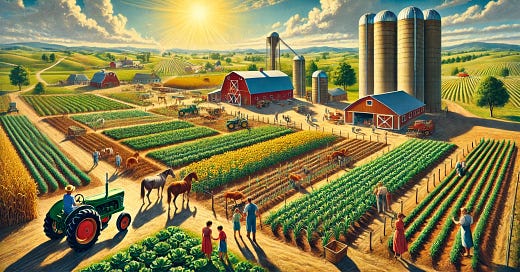Yeoman farmers have been the foundation of any successful society in the West. Tyranny cannot arise when citizens control their own livelihoods. When events occur which alter this state of affairs, it becomes clear that the passage of farmland from their hands inevitably leads to the slow decay of society. There are numerous historical examples.
The first case we will consider is Ancient Rome. For most of the history of the Roman Republic, most citizens were independent farmers who owned their own land. In the Punic wars, many were killed fighting Hannibal’s army and many of the survivors were impoverished to the point that they had sell their own land. They crowded into Rome, while their former estates were combined by wealthy absentee landlords into latifundia, the “wide fields” which were tended by innumerable slaves captured in battle. This societal transformation made it possible for the first emperor to seize power. The island of Barbados is located in the Caribbean Sea and was once home to a society of free English settlers. Clever investors soon realized that the land could generate the most profit if planted with sugarcane. As time passed, the properties of the settlers were bought up and converted to vast sugar plantations tended by slaves. Thus came Barbados to be run by the “Sugar Interest”, a few dozen families of absentee landlords who collected rent from a land they never saw. Farm consolidation in the Middle West of the United States has followed a remarkably similar pattern. The total number of farms fell nearly threefold in the twentieth century, reducing the number of yeomen by similar proportions. At this point in time, a small number of corporations of dubious origin and the wealthiest families in the nation control millions of acres of the most productive farmland in the country. To a large extent, the labor is not performed by citizens. In such a way has a new peculiar institution formed under our noses, and the former freeholders gathered into pointless sinecures in the cities. Indeed, this state of affairs is not unlike the arbitrary concentration of French nobility in Versailles before the Revolution.
.
If you wish to live outside of this system, the most logical course of action is to obtain your own land. You will not be the only one doing so. Millions of Americans are discovering that farming is not difficult, and that growing chickens is an excellent way to beat inflation. This decade marks the first perceivable rural population increase in over half a century. It is wise to study the fluctuating prices of agricultural real estate, and purchase at the bottom of economic cycles. In this way have Amish farmers established themselves in Upstate New York after a crash in the land market. Many places are more suited to family farming than others. It is best to focus on hilly locations, or places unsuited to large-scale mechanized agriculture. In my opinion, the Upper Peninsula of Michigan is one of the most undervalued places in the nation. However, as the world population begins to decline, so will the speculative value of land. More areas will become available to the small purchaser. For the founder of a parallel society, this becomes a most interesting state of affairs.
While parallel societies will require all sorts of people, it is hard to imagine one achieving success without producing its own food. Thus will yeoman farmers be an indispensable part of any such effort. In order to promote societal growth, a “land fund” for young farmers is logical, similar to what exists among the Amish in Ohio. However, I do not expect most such societies to use as little technology as them. Yeoman farmers will need vehicles, and can buy from distributed manufacturers. Their culture and education will come from independent libraries and schools. After work, their entertainment might come from Mid-America Films. The distributed manufacturers will also produce components the yeoman will use to build his house. So shall the form of the next civilization begin to appear. What are you waiting for?




